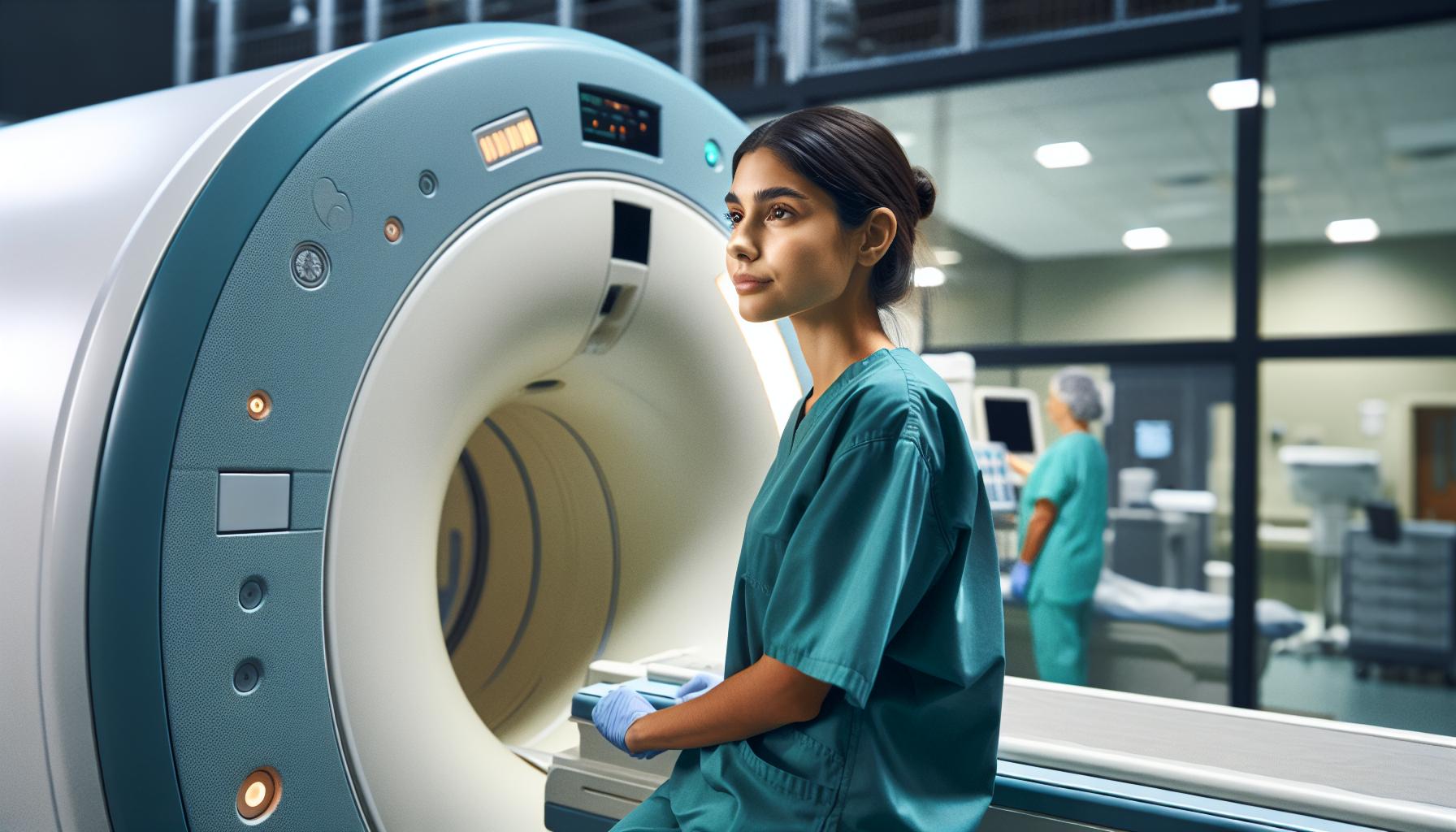MRI technologists play a vital role in the healthcare system by operating advanced imaging equipment to create detailed diagnostic images. In New Jersey, becoming an MRI tech offers a rewarding career path with strong job security and competitive salaries averaging over $80,000 per year. Starting a career as an MRI technologist in the Garden State requires specific education training and state licensure. While the journey involves several steps – from completing an accredited program to obtaining clinical experience – the growing demand for skilled MRI professionals makes it an attractive career choice. New Jersey’s aging population and expanding healthcare facilities continue to drive the need for qualified MRI technologists across the state.
How to Become an MRI Tech in NJ
An MRI technologist operates magnetic resonance imaging scanners to create detailed diagnostic images of patients’ internal structures. These healthcare professionals combine technical expertise with patient care skills to produce high-quality medical images for diagnosis.
Key Responsibilities and Work Environment
MRI technologists perform specialized duties in hospital radiology departments, imaging centers, and outpatient clinics. Their core responsibilities include:
- Preparing patients for MRI procedures by explaining the process, removing metal objects, and positioning them correctly
- Operating complex MRI equipment to capture precise diagnostic images
- Following physicians’ imaging protocols and specifications
- Maintaining patient safety by screening for medical implants or metal objects
- Documenting patient information and imaging procedures in medical records
- Monitoring patients during scans for comfort and safety
- Collaborating with radiologists and healthcare teams to ensure image quality
Work environments for MRI technologists include:
| Setting Type | Percentage of Employment |
|---|---|
| Hospitals | 61% |
| Medical Diagnostic Labs | 20% |
| Outpatient Centers | 12% |
| Physician Offices | 7% |
MRI technologists typically work 40-hour weeks with potential on-call, evening, or weekend shifts. The work requires standing for extended periods, lifting or moving patients, and adhering to safety protocols in controlled environments.
Educational Requirements in New Jersey

MRI technology education in New Jersey follows specific pathways through accredited institutions. The state requires formal education through either an associate’s or bachelor’s degree program in radiologic technology with specialized MRI coursework.
Associate’s Degree Programs
Associate degree programs in radiologic technology with MRI specialization take 24 months to complete. Programs include:
- 60 credit hours of combined classroom instruction clinical training
- Core courses in anatomy physiology medical terminology patient care
- Specialized MRI physics radiation safety image acquisition
- 1,000 hours of supervised clinical practice in approved healthcare facilities
- ARRT-aligned curriculum preparing students for certification exams
- 120 credit hours covering expanded theoretical knowledge practical skills
- Advanced coursework in healthcare management research methods
- Additional clinical rotations totaling 1,500 supervised hours
- Specialized electives in 3D imaging contrast procedures advanced protocols
- Cross-sectional anatomy pathology courses
- Research project requirements demonstrating technical expertise
| Program Type | Duration | Clinical Hours | Total Credits |
|---|---|---|---|
| Associate’s | 24 months | 1,000 hours | 60 credits |
| Bachelor’s | 48 months | 1,500 hours | 120 credits |
Licensing and Certification Process
MRI technologists in New Jersey must obtain both national certification and state licensure to practice legally. The process involves meeting specific educational requirements completing clinical training hours passing certification exams.
ARRT Certification Requirements
The American Registry of Radiologic Technologists (ARRT) certification process includes:
- Completion of an ARRT-approved educational program in magnetic resonance imaging
- Documentation of clinical competency in 56 MRI procedures
- Achievement of a minimum score of 75% on the ARRT certification exam
- Completion of 24 continuing education credits every two years
- Adherence to ARRT’s ethics requirements including no felony convictions
- Submission of a completed license application with a $60 fee
- Verification of ARRT certification in magnetic resonance imaging
- Proof of completing a state-approved MRI program
- Submission of official transcripts from educational institutions
- Passing the New Jersey State Jurisprudence Assessment Module
- Background check clearance through fingerprinting
- License renewal every two years with 24 continuing education credits
| Requirement Type | Timeline | Cost |
|---|---|---|
| ARRT Exam | 5 hours | $225 |
| NJ License | 4-6 weeks | $60 |
| Background Check | 1-2 weeks | $65 |
| License Renewal | Every 2 years | $90 |
Required Clinical Experience
Clinical experience forms a crucial component of MRI technologist training in New Jersey, combining hands-on practice with real-world application of classroom knowledge. The state maintains strict requirements for supervised practice hours and approved training locations.
Supervised Practice Hours
MRI technology students in New Jersey complete specific clinical hours based on their educational program:
- Associate degree programs require 1,000 supervised clinical hours
- Bachelor’s degree programs mandate 1,500 supervised clinical hours
- Clinical rotations span multiple imaging procedures including:
- Patient positioning techniques
- Scanner operation protocols
- Safety screening procedures
- Image quality assessment
- Emergency response protocols
Training Locations in New Jersey
New Jersey offers numerous ARRT-approved clinical sites for MRI technology training:
Hospital Settings
- AtlantiCare Regional Medical Center (Atlantic City)
- Hackensack University Medical Center
- Robert Wood Johnson University Hospital
- Saint Barnabas Medical Center
- Atlantic Medical Imaging (Multiple locations)
- RadNet New Jersey Centers
- University Radiology Group
- ProScan Imaging of New Jersey
- Direct supervision by licensed MRI technologists
- Experience with diverse patient populations
- Access to state-of-the-art MRI equipment
- Exposure to various scanning protocols
- Documentation of competency achievements
Career Growth and Advancement
MRI technologists in New Jersey experience significant career advancement opportunities through specialized certifications, leadership roles, and diverse workplace settings. The field offers multiple pathways for professional growth and increased earning potential.
Salary Expectations in New Jersey
Entry-level MRI technologists in New Jersey earn an average starting salary of $65,000. Experienced professionals with 5+ years of experience command salaries of $85,000-$95,000, while senior technologists with specialized certifications earn $100,000+. Geographic location impacts earnings:
| Location | Average Annual Salary |
|---|---|
| Newark | $88,500 |
| Jersey City | $87,900 |
| Princeton | $86,400 |
| Atlantic City | $84,200 |
| Camden | $83,600 |
Professional Development Opportunities
MRI technologists advance their careers through:
- Specialized Certifications
- Cardiac MRI
- Musculoskeletal MRI
- Breast MRI
- Neurological MRI
- Management Positions
- Lead MRI Technologist
- Radiology Department Manager
- Clinical Instructor
- Quality Assurance Coordinator
- Educational Advancement
- Bachelor’s degree completion programs
- Master’s in Healthcare Administration
- Medical Imaging Education
- Healthcare Informatics
Professional organizations support career growth:
- American Society of Radiologic Technologists (ASRT)
- Society for MR Radiographers & Technologists (SMRT)
- New Jersey Society of Radiologic Technologists (NJSRT)
- Continuing education credits
- Networking events
- Research opportunities
- Leadership development programs
- Professional conferences
New Jersey Healthcare Facilities Hiring MRI Techs
New Jersey’s diverse healthcare landscape offers abundant employment opportunities for MRI technologists across various medical settings. The state’s healthcare facilities actively recruit qualified MRI professionals to meet growing diagnostic imaging needs.
Major Hospitals and Medical Centers
Top-tier hospitals in New Jersey employ MRI technologists across multiple locations and departments. Notable employers include:
- Hackensack University Medical Center: Features 8 MRI suites with advanced 3T imaging technology
- RWJ Barnabas Health System: Operates 15 facilities throughout NJ with diagnostic imaging departments
- Atlantic Health System: Maintains 6 hospitals with state-of-the-art imaging centers
- Cooper University Health Care: Houses 4 dedicated MRI units in their Camden facility
- Valley Health System: Provides imaging services at 3 hospital locations in Bergen County
| Hospital System | Number of Facilities | Average Starting Salary |
|---|---|---|
| RWJ Barnabas | 15 | $68,000 |
| Atlantic Health | 6 | $70,000 |
| Hackensack | 4 | $72,000 |
| Cooper | 3 | $67,000 |
| Valley Health | 3 | $69,000 |
- RadNet New Jersey: Operates 25 outpatient imaging centers statewide
- ImageCare Centers: Maintains 12 locations throughout northern NJ
- Princeton Radiology: Features 5 imaging facilities in central NJ
- Tri-County Imaging: Provides services at 4 locations in southern NJ
- Advanced Imaging Centers: Runs 3 specialized diagnostic facilities
| Practice Type | Number of Centers | Work Schedule Options |
|---|---|---|
| Full-Service | 35 | Standard 40-hour |
| Specialized | 15 | Part-time available |
| Mobile Units | 8 | Flexible scheduling |
Becoming an MRI technologist in New Jersey offers a rewarding career path with excellent growth potential and competitive compensation. The journey requires dedication to complete the necessary education requirements accredited clinical training and licensing processes. While the path demands commitment it leads to a fulfilling career in healthcare with numerous opportunities for advancement and specialization. Those interested in pursuing this career can look forward to joining a dynamic field that combines technical expertise with patient care. New Jersey’s healthcare landscape continues to expand creating a strong demand for qualified MRI technologists across various healthcare settings. With proper preparation and dedication aspiring MRI techs can build successful careers in this essential healthcare profession.



